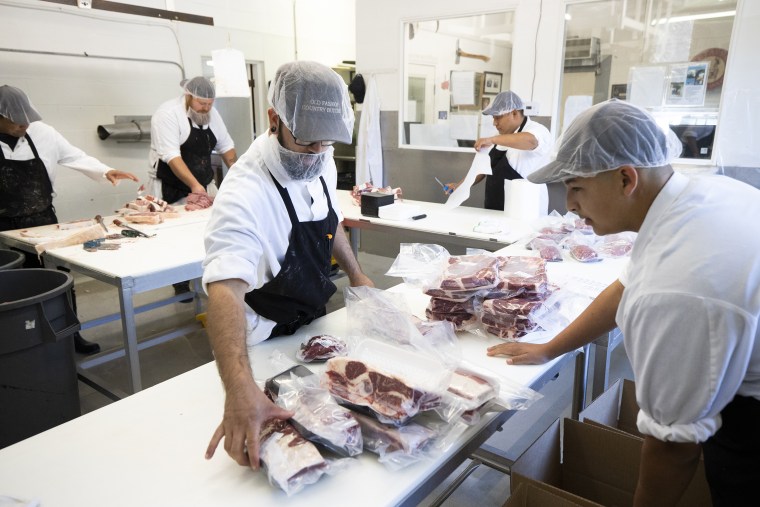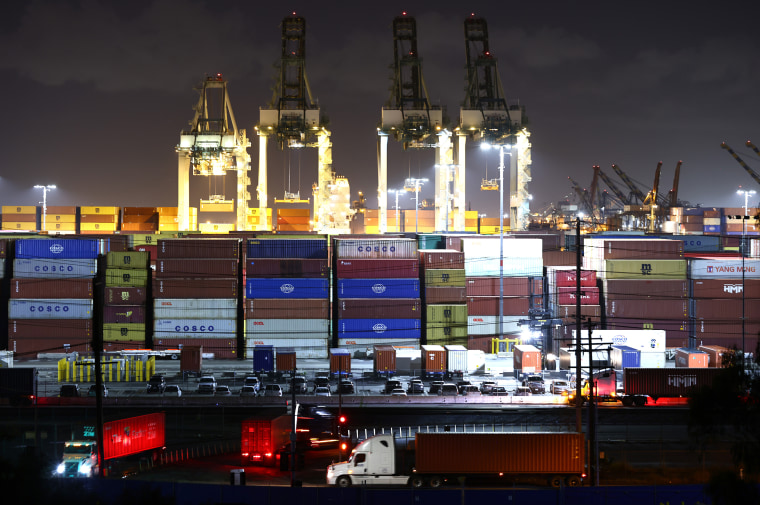The recent spread of the omicron variant among supply chain workers, sour weather and even a recall of bagged salads and vegetables have caused Americans to once again find barren shelves at supermarkets or retail stores.
While industry leaders hope this latest supply chain foul-up will be a short-term frustration, it comes amid the ongoing challenges they’ve faced during the pandemic: shipping delays, congestion at ports, labor shortages and more.
Doug Baker, vice president of industry relations for the Food Marketing Institute, a trade group, said the latest Covid-19 variant and the bad stretch of winter weather have made the supply chain situation worse. He said he remained hopeful things would normalize again once the country got through the omicron surge.
“Supply chain constraints and shelf conditions will continue to have their ebbs and flows, but maybe by the back half of 2022 we’ll start seeing some normalizing of the supply chain,” he said. “You have to put an asterisk on that because we can get another variant and another spike in cases, and we’re starting to see really abnormal weather patterns.”
Rain and tornadoes in the spring followed by an active hurricane season could have a heavy effect on the country’s supply chain, Baker noted, and the industry is still contending with how best to make itself attractive to workers.
The number of people who voluntarily quit their jobs surged to 4.5 million in November, the U.S. Department of Labor’s monthly job openings and labor turnover survey said last week, indicating Americans are increasingly confident they can find better opportunities in the labor market.
As these jobs remain unfilled and the omicron variant is able to find a foothold among the largely vaccinated meatpacking workforce, the labor shortages are further exacerbated, said Mark Lauritsen, international vice president for meatpacking at the United Food and Commercial Workers International Union.

“Because of the absences that we do have, combined with the labor shortage in this industry, you are seeing the lines are running slower than they were,” he said. “[Meatpacking plants] tend to find enough through rearranging staff to keep the slaughter side fully staffed, but then there isn’t always enough on the other side of the plant — the processing side.”
Jon Samson, an executive director at the American Trucking Associations, said the omicron variant hasn’t spread among truckers, but there is a noticeable slowdown of pickup and drop-offs at warehouses, ports, retailers and stores because of a shortage of workers.
Samson, who testified before Congress in November regarding the nation’s supply chain issues, said his industry was already short 80,000 drivers before the pandemic — a challenge it has struggled through — but now it is having trouble getting the trucks loaded and unloaded, and abiding by the delivery times it is supposed to fulfill.

“Fifty percent of the people we’re in contact with have had this new variant,” he said. “I think things around the supply chain were getting a little bit better, but now you get to ports, warehouses, restaurants, grocery stores and fast-food restaurants, and omicron has really impacted their ability to staff up properly.”
Though the meatpacking industry has voluntarily instituted its own vaccine mandates to a great deal of success, Samson and some other industry leaders said they are concerned the vaccine mandate pushed by the Biden administration could make the labor problems worse because it would not allow them to hire unvaccinated workers.
The Supreme Court is considering a legal challenge to the Biden mandate by the American Trucking Associations.
Ed Cinco, director of purchasing at Schwebel’s Baking Co., said his company of about 800 employees in Ohio has struggled with labor shortages through the pandemic. He said “if the vaccine mandate goes through, it’s going to be bad” for his ability to hire and maintain his current workforce.
“I have people who work here that are not vaccinated that can retire and will retire if they force it,” he said. “When that happens, it’s going to be really bad.”
While the opposition to vaccines and the Biden administration’s vaccine mandate may impact store shelves in the future, experts believe the latest dearth of groceries and goods will end soon.
The items are in the pipeline, Baker said, it’s just taking them a little longer to get past the pandemic’s latest hurdles. In the meantime, he suggested shopping around or calling your favorite grocery stores before you visit them.
“We’re all going through this latest unknown together,” he said. “We’re dealing with another spike, and we’ll get through this one — and then we’ll move on to whatever’s facing us next.”
